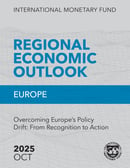<br>
This web page presents information about the work of the IMF in Serbia, including the activities of the IMF Resident Representative Office. Additional information can be found on the Serbia and IMF country page, including IMF reports and Executive Board documents that deal with Serbia.
At A Glance
Office Activities
IMF’s Work on Serbia
No results found. Either there was an error with the web service or there is no data returned by the web service.
Regional Economic Outlook
October 17, 2025

Europe’s growth is slowing and debt rising. Closing the productivity gap with the US is firmly in Europe’s grasp. Discussions need to move from recognition to action: deepen integration, raise productivity and secure long-term fiscal sustainability.
Read the Report



